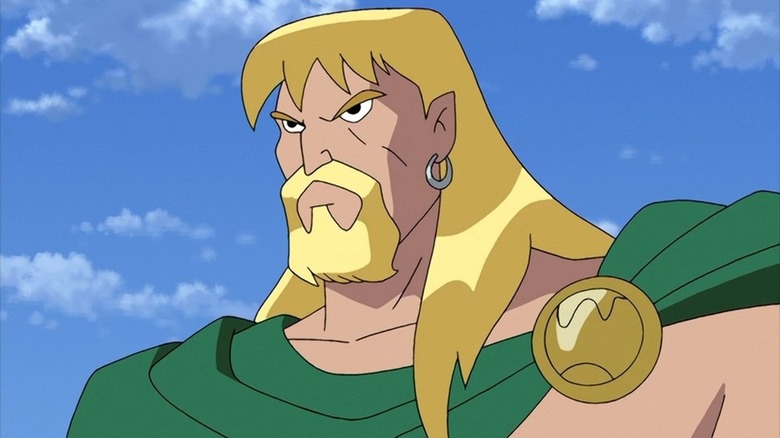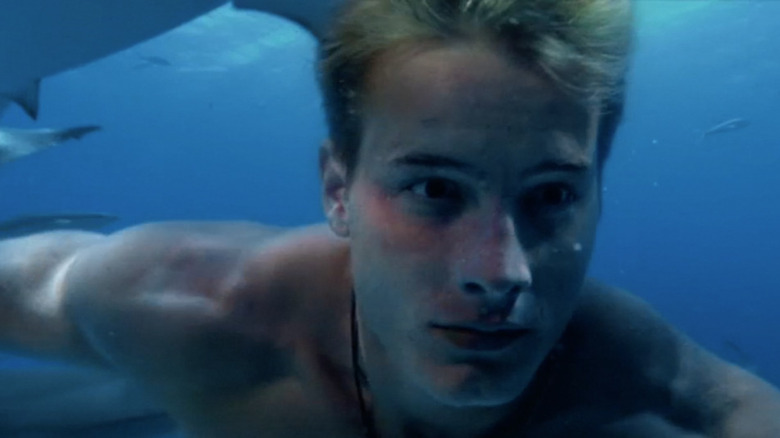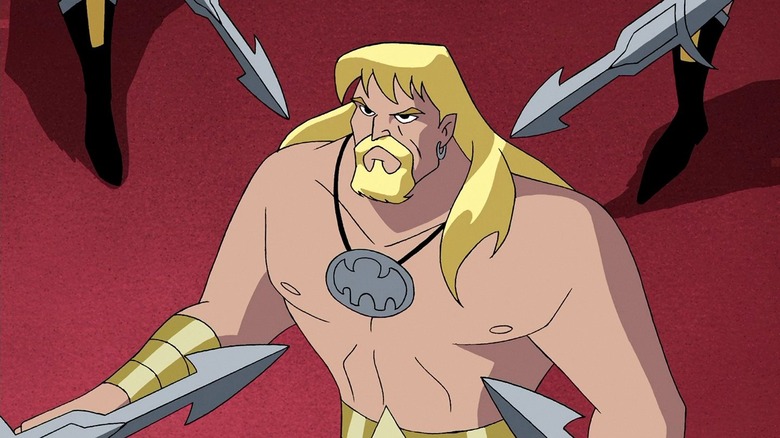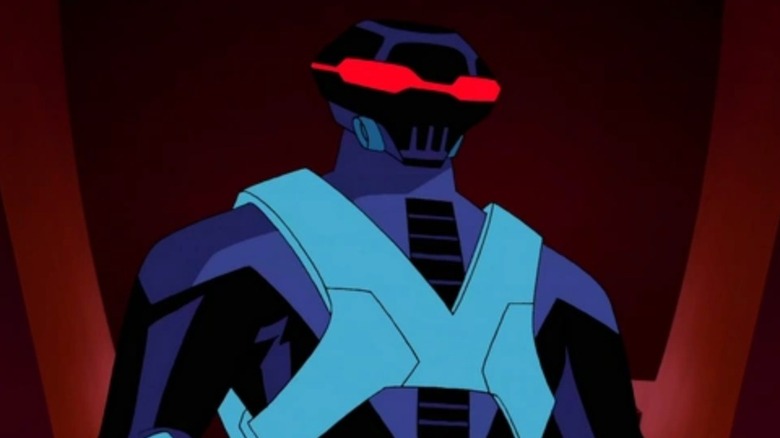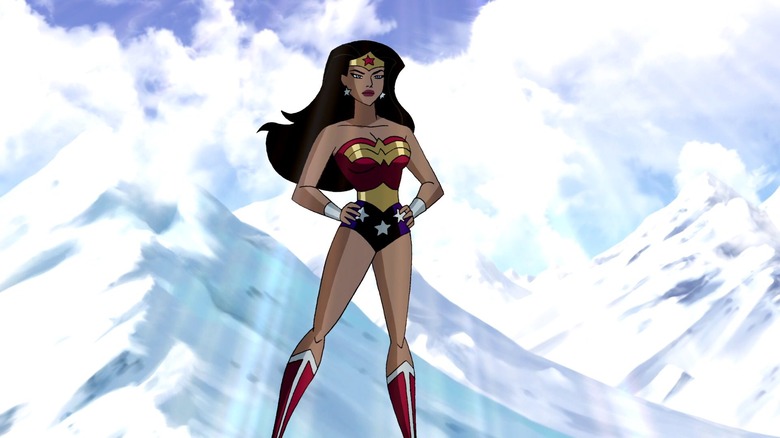Why Aquaman Was Off-Limits In Justice League Unlimited
"Justice League Unlimited" is a pinnacle of superhero cartoons. Had its airing not intersected with my childhood, my fascination with comics probably wouldn't have blossomed the way it did.
The terrific final product wasn't a sign of the creators always working under ideal conditions, however. In the 2000s, Warner Bros. was quite particular about letting DC Comics characters appear in more than one show at a time, apparently out of concern that audiences would be confused by multiple versions of the same character — hence the infamous "Bat-Embargo." 2004, the year that "Justice League Unlimited" began, also saw the premiere of "The Batman," a solo cartoon about, well, Batman, but set in a different continuity. Batman's villains and supporting cast were therefore off-limits to the "Justice League" team (though not the Dark Knight himself, who was evidently too much of a well-established centerpiece to be written out).
Gotham City wasn't the only corner of the DC Universe hit by this embargo. Aquaman and his associated characters were also made verboten after "Justice League Unlimited" season 1. Even if you're an ardent DC fan, you're probably not familiar with any "Aquaman" media produced at this time. Well, there's a good reason for that.
The unmade Aquaman TV show
In 2005, an "Aquaman" pilot (titled "Mercy Reef") was commissioned for the WB TV Network by "Smallville" creators Al Gough and Miles Millar; Aquaman had previously guest-starred in "Smallville" season 5 episode "Aqua," played by future "Reacher" star Alan Ritchson. That episode was well-rated, being one of the few times "Smallville" season 5 cracked 6 million viewers. So, a spin-off seemed like a no-brainer.
The pilot, starring Justin Hartley as Arthur Curry/Aquaman, was not picked up for series — in 2006, the WB was merged with UPN to create the CW, which apparently didn't have room for "Aquaman." The finished episode was soon made available to rent online but remains basically a footnote, albeit one with some heavy ramifications.
Hartley was cast on "Smallville" season 6 the following year as Oliver Queen/Green Arrow. Thanks to the still ongoing Bat-Embargo, Green Arrow was employed in "Smallville" as a clear substitute for Batman, with Oliver spending the rest of the series as Clark Kent's vigilante foil. As for "Justice League," the show downplayed Aquaman from the beginning, even before it went "Unlimited."
Aquaman and the Justice League
Aquaman is traditionally a founding member of the Justice League in the comics, but not in the cartoon; his spot as the League's seventh member was taken by Hawkgirl. The go-to speculation is that the creators wanted the League to be less of a sausage-fest (without Hawkgirl, the only woman on the team would be Wonder Woman). Since Aquaman still had the stench of "Super Friends" lameness on him, he must've seemed the most expendable.
However, this allowed the show to reimagine Aquaman. He debuts early on in "Justice League" season 1's "The Enemy Below," boasting the bearded barbarian king look from Peter David's comic run (that would later influence Jason Momoa's live-action Arthur). The episode portrays Aquaman (voiced by Scott Rummell) as something of an antagonist. The cold open is him leading an attack on a U.S. submarine intruding on Atlantean territory. The ultimate villain of the episode is his treasonous brother Orm, but Arthur boasts a scowl and a ruthless attitude ill-befitting a more traditional superhero.
Basically, "Justice League" Aquaman rules and it's a shame the show didn't do more with him. He would eventually join the League during "Unlimited," but his time with them was short due to the aforementioned embargo. Maybe excluding him worked out in the long run — it would've been awkward to eventually write out an original main character — or perhaps WB would've made an exception like with Batman if Arthur had been there from the beginning.
Devil Ray
While Aquaman himself never shows up after season 1's "Wake the Dead,' the "Justice League Unlimited" team found a loophole with one of his villains.
Season 3 of "Justice League Unlimited" is about the Legion of Doom, an alliance of dozens of supervillains founded by Gorilla Grodd (and later taken over by Lex Luthor). The show had not yet introduced Aquaman's nemesis Black Manta, so to add him to the Legion, they just changed his name to "Devil Ray."
Devil Ray is transparently Black Manta. His costume could've easily been used for Manta himself, and while he's never seen unmasked, he's voiced by African-American actor Michael Beach. And yet, the name change apparently satisfied the WB suits.
Devil Ray debuts in "Justice League Unlimited" season 3, episode 4, "To Another Shore." Wonder Woman is attending an environmental conference in Scandavania, where a glacier just broke to reveal an ancient Viking ship frozen inside. Legend tells that the Viking inside, Prince Jon, was cursed by Odin with invulnerability so he could never die a heroic death and go to Valhalla. Luthor and Grodd want to reverse-engineer this ability from the Viking Prince's corpse, so Devil Ray leads a squad to claim the ship for the Legion.
Subbing Aquaman for Wonder Woman
Posting on the ToonZone (now AnimeSuperhero) forums in 2006, "Justice League" showrunner Bruce Timm confirmed "To Another Shore" was first envisioned as an Aquaman episode. That explains the episode's setting (global warming is more Arthur's concern, even if Diana says she's at the conference representing Themyscira) and villain choice. Indeed, Devil Ray is portrayed as having some pre-established enmity with Wonder Woman; when he gets the chance to kill her, he snickers, "This is just too good to be true." Such a comment would demand no explanation if Aquaman was in Diana's place.
Devil Ray is killed in his second appearance, "Dead Reckoning" — he tries to shoot Wonder Woman, so the ghostly Deadman possesses Batman and shoots him instead. According to Timm, they "probably" wouldn't have been allowed to do this had the character been Black Manta himself.
Throughout his post, Timm argues the creative limitations he and his team faced usually made for a better story. For instance, "To Another Shore" has a subplot of Diana trying to convince Martian Manhunter to get over his workaholism and connect with humanity. The writers only thought of this because of Diana and J'onn's pre-established friendship; if Aquaman was leading the episode, that character development would've been lost. As Timm puts it, "['To Another Shore'] sings a much sweeter song than if the 'Aquaman embargo' hadn't been in place."
It's tempting to imagine what stories "Justice League Unlimited" could've told without these various embargoes, but the grass is already green enough on this side of reality.
